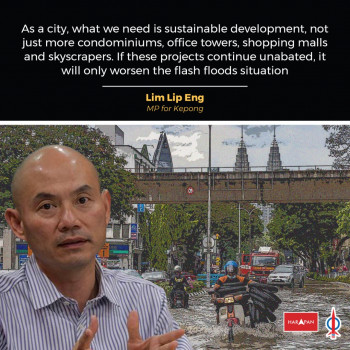by CK Tay, translated by Dominic Lau
The dust has settled on the GE13 outcome in the midst of millions of question marks.
A much bigger question mark that comes with it, is whether a “Chinese tsunami” as claimed by the PM has actually taken form in view of the fact that majority of Chinese voters have dumped Barisan Nasional in GE13.
Najib has always positioned himself as a prime minister for all Malaysians. His 1Malaysia concept transcends the boundary of race and advocates that we are all Malaysians irrespective of race and religion. Such a heart-warming slogan has penetrated deep inside the hearts of many Malaysians over the past few years, so much so that Malaysians have become more familiar with it than the symbol of white colour balance on a dark blue background.
Commanding BN’s election war for the first time, Najib was being scrutinised by all Malaysians. He successfully led BN’s quest to retain Putrajaya, and BN’s support should have come from people of all ethnic backgrounds who supported the concept of 1Malaysia, including many Chinese voters.
In Kedah, both Malays and Chinese voted for BN because they were unhappy with the performance of the previous PAS-led administration, marking a victory on the part of the ruling coalition under the country’s two-party system.
In Selangor, Pakatan, whose elected reps have been picked from the three major races of this country, won with an overwhelming two-thirds majority, and secured thumping victory in some Malay-dominant constituencies.
In Johor, Lim Kit Siang wouldn’t have triumphed in Gelang Patah with Chinese votes alone. In the eyes of most Malaysians, the battle in Gelang Patah was not one between a Chinese and a Malay candidate. Voters did not judge by the colour of the candidates’ skin, but rather the policies of the two opposing camps.
As for Kelantan, there was no way Chinese Kelantanese alone could send most of PAS’ candidates to the state assembly. It was the decision of majority of Malay voters. So, the “Chinese tsunami” excuse is out of question here.
Najib has urged all Malaysians to accept the election outcome. In a similar manner, he should have also accepted the triumph of BN from the perspectives of all Malaysians irrespective of race, because the decisions have been made by all the voters in this country.
BN should take more factors into consideration if it is really serous in analysing the election results and conducting a genuine soul-searching. It must refrain from drawing conclusions from the angle of race and interpret the election results based on the same. On the contrary, it should evaluate the extent of this tsunami geographically.
To illustrate the point, coastal and urban areas are much more susceptible to the tsunami while the interiors are largely spared. This phenomenon is consistent on both sides of the South China Sea.
An “urban tsunami” should be a better term to explain what took place on May 5.
Rural voters went for BN because they believed the ruling coalition could take better care of people living deep in the interiors. As such, BN might as well act just as a “rural government” and Najib a “rural PM” bringing better lives to people of lower income groups in the countryside as a token of appreciation for their undivided loyalty.
The question is, will BN still retain their support if people living in the rural areas begin to enjoy improved living quality on par with that in cities and towns?
As such, it is imperative that BN look into ways of connecting with urban folks and the world at large and not be contented with just being a “kampung champion.”
* This article first appeared in mysinchew and the views expressed here are the personal opinion of the columnist.




Pingback: Not just a Chinese tsunami | PR